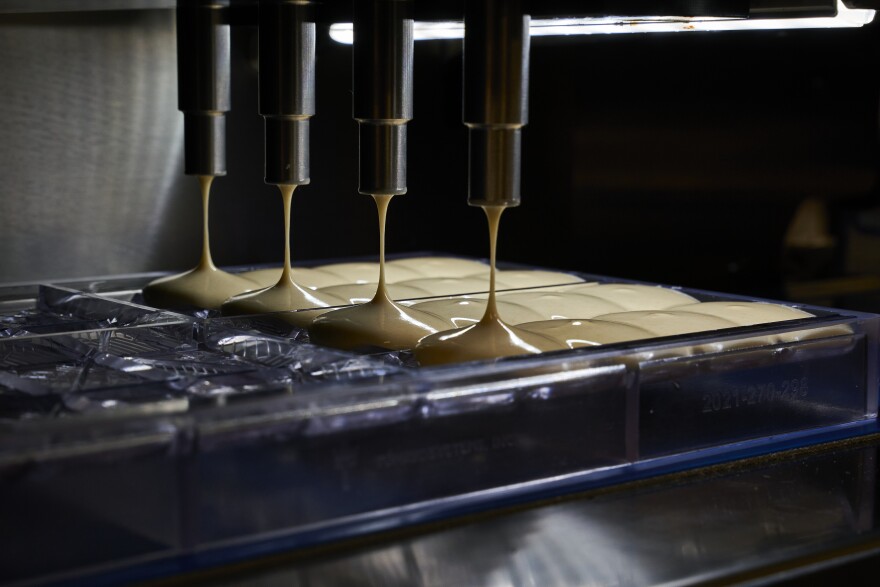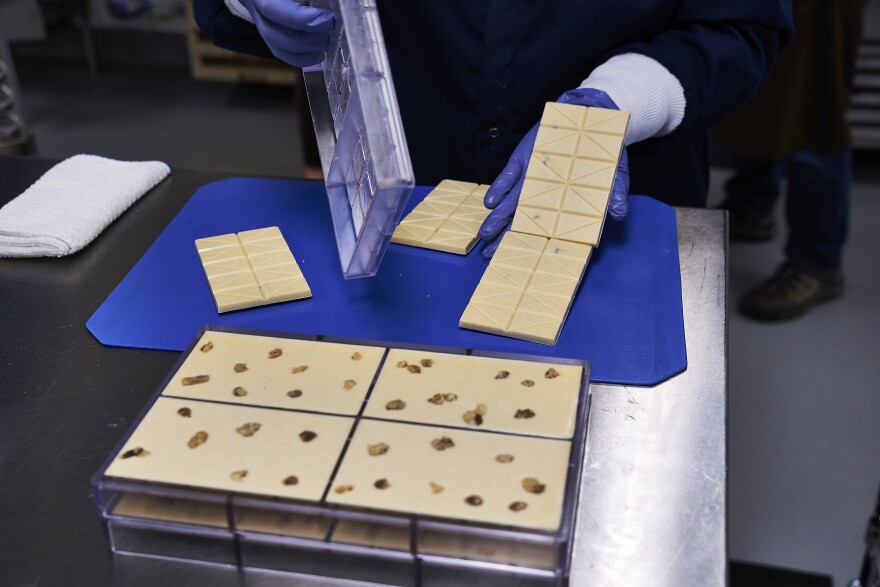Cannabis-infused food has come a long way from dorm room pot brownies.
The options are growing for Missouri’s nearly 100,000 medical marijuana card holders who prefer to take in cannabis by eating rather than smoking. More dispensaries are popping up in the St. Louis region offering infused soda, gumdrops and cookies.
As other companies ramp up production, a team led by Dave Owens, director of culinary at Proper Brands, is one of the few producers of cannabis-infused chocolate bars in the state.
Owens has been making sweets for more than a decade, most recently as the head chocolatier at local confectioner Bissinger’s.
“Using cannabis as an ingredient is completely different to me,” he said. “But I just consider it another, just highly regulated, ingredient.”

The smell of banana hung in the air on a recent morning inside his confectionery kitchen near Brentwood in west St. Louis County. Confectionery machines hummed while churning big tubs filled with white chocolate, banana powder and distillate — a form of concentrated cannabis oil.
“It’s very much the consistency of honey right now,” said Owens, pulling out a jar of distillate from a warming container. “If it's at room temperature, it's like tar and you can't handle it.”
Owens said he has to carefully measure the exact dosage of distillate and distribute it into cocoa butter before mixing it in with the chocolate. Getting the flavor and dosing right is critical.
“Because the idea is even though it’s a medicinal product here in the state of Missouri, it should still be a fine confection, and everyone should enjoy it and want just a little bit more,” he said.

Owens’ small team can produce more than a thousand chocolate bars and 20,000 gumdrops a day. Soon they’ll add mints to the roster too.
Down the hall from the kitchen there’s a vault filled with racks of chocolate bars waiting to be sent out to dispensaries across the state, including Proper Cannabis in the St. Louis region. Owens said it takes three to five days to get results back from the testing lab to verify the amount and quality of the cannabis used in the products.
“I want people to know there's a lot of behind the scenes that goes on in order to get this to the shelves, and it takes a little bit of time,” he said.

‘A normal meal — with a surprise’
Demand in Missouri for edibles from dispensaries is booming, but some say there need to be more savory options.
Brennan England is the president of the Missouri chapter of Minorities for Medical Marijuana and the owner of a cannabis consumption lounge called The Cola Lounge on Cherokee Street.
He argues the dispensary market is oversaturated with sugary goods.
“For the most at-need medical patients, that is the opposite of what they should be having with their medicine — it's inflammatory, it's acidic,” he said. “Being able to find ways to consume cannabis that are enjoyable and intersect with your regular lifestyle but also aren't just sugary treats, is really important.”
That’s a big part of the educational component of his lounge, where he recently held a cooking class on how to make cannabis-infused butter. He’s also providing a space for cannabis chefs to host private dining experiences.
Cannabis catering company Rooted Buds has taken off since hosting its first event at the lounge last year. Co-founders Chef Snoop THC Hollins, Chef Dow Dugger and Denise Winfield-Hollins have cultivation and caregiver licenses from the state that allow them to grow and cook with cannabis that has THC, the psychoactive component of the plant.
But they only cook with THC for their patients and private parties where members have their medical cards. Otherwise, they can only use CBD cannabis in their meals. Hollins said consumers of CBD won’t feel high, but they can expect to feel “nice and mellow.”
“It's kind of equivalent to drinking a glass of wine,” she said.
Similar to wine, different cannabis strains have a variety of tasting notes, called terpenes. Hollins said those can be complemented by pairing the right strain with the right ingredients.
“When you smell cannabis you think of citrus or pepper, cinnamon,” she said. “So as with wine, we will think, ‘OK, if I smell something citrus, well that probably has limonene in it so we'll probably go with adding a little lime or lemon, something citrusy to it.’”
Hollins and Dugger have worked in fine dining restaurants and bakeries for years in St. Louis and Chicago. That skill shows as they artfully layer different strains of cannabis flower and tinctures throughout a plated meal of jackfruit tacos and elote.
They’ve infused salt to season the jackfruit, oil to fry the tortillas and a pico de gallo-type sauce on the side. As a finishing touch, Dugger shaves cannabis flower on top of the corn.
“The way we infuse, it’s a low, slow process,” Dugger said. “It's not like that 40 pounds of weed, that brownie that your buddy made you. It’s a normal meal — with a surprise.”
The cheese oozed out of the tacos as Hollins went in for a taste.
“As you bite it you can literally taste the herb, but just a little bit of earthiness as if it was fresh cilantro picked out of the garden,” she said.
The culinary duo said their goal is to break stereotypes about cannabis and show off the benefits of the plant in ways that people can relate to.
“We can bridge through food,” Dugger said. “Everyone comes to someone's house and they always dine, they have fun, they conversate, they meet someone new — that's a bridge.”
Follow Corinne on Twitter: @corinnesusan
Copyright 2021 St. Louis Public Radio. To see more, visit St. Louis Public Radio.





